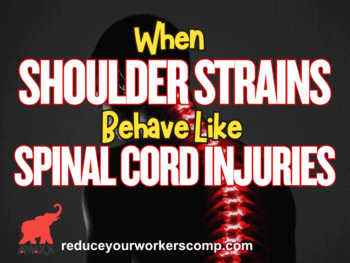More about issues and buzzwords that are sure to disgruntle the claims adjuster. These are meant to be lighthearted, but for the most part they are correct. So here we go. The content is provided by an interview with a claims adjuster at a major carrier.
-
Fibbing about never having a workers comp claim before
It is understandable that there is a little distrust between the claimant and insurance adjuster in the beginning. If there was ever a claim of any sort before, the claimants do worry about not being entitled to the benefits. A lot of this has to do with the fear of the unknown. A small percentage of people make being a career claimant their full time job. Yes, really.
But do not get off on the wrong foot early on in the claim. I think most people feel that all carriers “share” information on people. That is true to a point, but not all the time. ISO reports and other ways of sharing information are out there and available to every adjuster, it is just a matter of finding it. The adjuster will probably run through the motions of doing an initial background check with just about every claim they receive. This is part of the initial claim set up. The carrier does this to protect itself against fear of the unknown. Carriers deal with thousands of claimants per year, and they will do what they can to ensure that they are paying claims that should be paid, guided by the statutes within the jurisdiction they do business in.
Click Link to Access Free PDF Download
“How Do I Get My Adjusters To Follow My Account Handling Instructions?”
Sage advice is that honesty is always the best policy. Just because there is a claim or two in the past does not mean the current claim will be doomed. But the more attempt to hide it, the more it will come back to haunt. The adjuster’s job is to get the help needed and to get the employee returned to work good as new. If they find claims in the background that were not shared with them, it will become a beacon on the radar. Be assured that the adjuster will go the distance in overturning every rock they have to in order to feel they have completed a thorough investigation. So just be honest, remember the adjuster is there to help not fight. Adjusters take it as a point of pride that the claims they pay are legitimate.
-
Grunting and groaning on the phone while talking to the adjuster
Being in pain is no fun. Just the fact there is a claim to file indicates having some sort of medical issue. But please do not drive the point home by being unable to complete a sentence without groaning in unbearable pain. We understand there is pain, but can a decent laceration be that disabling? Sure everyone has their own pain threshold, and some people can deal with pain better than others deal, but again please just act normally. The more over the top it is, the less believable it becomes. The doctor will also indicate in the notes the pain appears out of proportion to the injury. This is known as one of the several “Waddell’s signs” that are used to judge pain and injury behavior. Like I stated …. just be honest. There are no Oscars for the performance.
-
Trying to charge $40/hour for attendant care services or demanding 24-hour/day medical attendant care
Some states leave wages open for family attendant care. Adjusters prefer to allow the use of the husband/wife as caretaker for assistance with activities of daily living. This makes it easier in recovery, instead of the carrier bringing in an outside vendor and person to do this work for them. It is also cheaper this way, but do not overcharge for hours and duties performed by the caretaker. Nothing will irritate the adjuster more than receiving a bill for 24 hrs per day, 7 day per week attendant care. Obviously this is not reasonable or acceptable. In fact most jurisdictions will have caps and price limits on what is entitled anyway, so again just bill for the services needed and nothing else. The more the issue is pushed, the more of a red flag the adjuster will raise that there are some secondary gain issues going on.
-
Lying about the mileage to be reimbursed
The same goes true for mileage. If the claimant tries to say that the therapy facility is 50 miles away, that makes no sense. Especially if the adjuster resides in the same city. These are all red flags that the adjuster will see and cause more surveillance. And the adjuster can use their own resources (such as Mapquest) to get exact mileage.
-
Being a “Google physician”
The internet has certainly made the physician’s job more difficult. Most people will Google the injury and find out as much information as they can. But the injured worker does not qualify as a medical physician. Try to talk shop with the adjuster, but the adjuster has handled claims like these for years, and they know the timeframe and the improvement step to make, and when they should be made. Any derivation from that timeline template raises the red flag and a watchful eye. So again instead of this helping the scenario, it is hurting it in the long run. It is ok to look around online for some information, but there are also many unreliable resources out there, and do not be misled. The focus should be on doing what the doctors and therapists advise, not on what the “internet doctor” suggests.
-
“Risk drivers”
To finish this article off, I thought I would include the Carrier. I have worked at a few different carriers in my time. And though they all differ in little ways, they are more similar than different globally.
Two words that have irritated adjusters since the dawn of time are “risk drivers.” These are the non-injury facts that can contribute to disability. Risk drivers can include obesity, diabetes, having a young child at home (being off of work decreases daycare costs), not wanting to go back to work in general, pending layoffs at the employer of the injured, smoking, and on and on. There are thousands of possible risk drivers. Some do have actual bearing on the claim, and some are ridiculous. Just because one risk driver can apply to one person, it may not affect another person in the same way. It is all theory, and they all succeed in complicating the claim. Most adjusters don’t care about what “could” happen; adjusters want to know what will actually affect the claim, and why it will do so. Adjusters do not care about theory, because the theory may not affect the claim at all. It is just aggravating and pointless to hear those words “risk drivers.” [WCx] Hum… what does this mean for data mining?
Summary
So there it is, words, and issues that annoy adjusters. These will never go away, and will probably increase in use as time goes on. But the main point here is that all of these issues can affect a claim negatively. So if you are a claimant and reading this take note to be honest. It will help the claimant, the adjuster, and the injury scenario. The more honest everyone is, the better the claim can be handled, and the faster the claimant can recover and get back to work.
Author Rebecca Shafer, JD, President of Amaxx Risk Solutions, Inc. is a national expert in the field of workers compensation. She is a writer, speaker, and publisher. Her expertise is working with employers to reduce workers compensation costs, and her clients include airlines, healthcare, printing/publishing, pharmaceuticals, retail, hospitality, and manufacturing. She is the author of the #1 selling book on cost containment, Workers Compensation Management Program: Reduce Costs 20% to 50%. Contact: RShafer@ReduceYourWorkersComp.com.
WORKERS COMP MANAGEMENT GUIDEBOOK: www.WCManual.com
WORK COMP CALCULATOR: www.LowerWC.com/calculator.php
MODIFIED DUTY CALCULATOR: www.LowerWC.com/transitional-duty-cost-calculator.php
Do not use this information without independent verification. All state laws vary. You should consult with your insurance broker or agent about workers comp issues.
©2012 Amaxx Risk Solutions, Inc. All rights reserved under International Copyright Law. If you would like permission to reprint this material, contact us at: Info@ReduceYourWorkersComp.com.



























